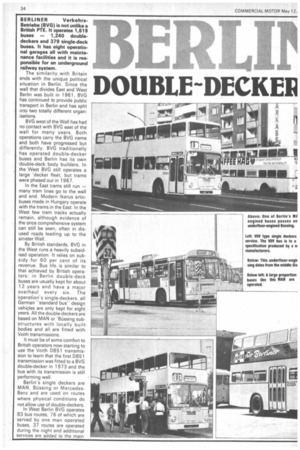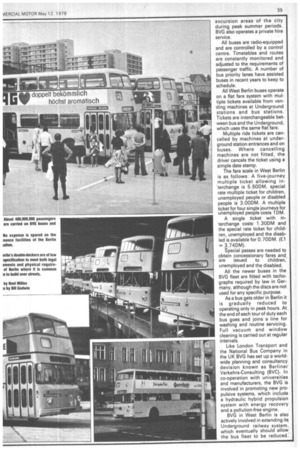DOUBLE~DIECKEE
Page 36

Page 37

If you've noticed an error in this article please click here to report it so we can fix it.
BERLINER Verkehrs Betriebe (BVG) is not unlike a British PTE. It operates 1,619 buses — 1,240 doubledeckers and 379 single-deck buses. It has eight operational garages all with maintenance facilities and it is responsible for an underground railway system.
The similarity with Britain ends with the unique political situation in Berlin. Since the wall that divides East and West Berlin was built in 1961, BVG has continued to provide public transport in Berlin and has split into two totally different organisations.
BVG west of the Wall has had no contact with BVG east of the wall for many years. Both operations carry the BVG name and both have progressed but differently. BVG traditionally has operated double-decker buses and Berlin has its own double-deck body builders. In the West BVG still operates a large 'decker fleet, but trams were phased out in 1967.
In the East trams still run — many tram lines go to the wall and end. Modern lkarus articbuses made in Hungary operate with the trams in the East. In the West few tram tracks actually remain, although evidence of the once comprehensive system can still be seen, often in disused roads leading up to the sinister Wall,
By British standards, BVG in the West runs a heavily subsidised operation. It relies on subsidy for 60 per cent of its revenue. Bus life is similar to that achieved by British operators: in Berlin double-deck buses are usually kept for about 12 years and have a major overhaul. every six. The operation's single-deckers, all German "standard busdesign vehicles are only kept for eight years. All the double-deckers are based on MAN or 'Bussing substructures with locally built bodies and all are fitted with Voith transmissions.
It must be of some comfort to British operators now starting to use the Voith D851 transmission to learn that the first D851 transmission was fitted to a BVG double-decker in 1973 and the bus with its transmission is still performing well.
Berlin's single deckers are MAN, Bussing or MercedesBenz and are used on routes where physical conditions do not allow use of double-deckers.
In West Berlin BVG operates 83 bus routes, 76 of which are served by one man operated buses, 37 routes are operated during the night and additional services are added to the main excursion areas of the city during peak summer periods. BVG also operates a private hire service.
All buses are radio-equipped and are controlled by a control centre. Timetables and routes are constantly monitored and adjusted to the requirements of passenger traffic. A number of bus priority lanes have assisted buses in recent years to keep to schedule.
All West Berlin buses operate on a flat fare system with multiple tickets available from vending machines at Underground stations and bus stations. Tickets are interchangeable between bus and the Underground, which uses the same flat fare.
Multiple ride tickets are cancelled by machines at underground station entrances and on buses. Where cancelling machines are not fitted, the driver cancels the ticket using a simple date stamp.
The fare scale in West Berlin is as follows A five-journey multiple ticket allowing in'terchange is 5.50DM, special rate multiple ticket for children, unemployed people or disabled people is 3.00DM. A multiple ticket for four single journeys for unemployed people costs 1DM.
A single ticket with interchange costs 1.30DM and the special rate ticket for children, unemployed and the disabled is available for 0.70DM. (El = 3.74DM). Special passes are needed to obtain concessionary fares and
are issued to children,unemployed and the disabled.
All the newer buses in the BVG fleet are fitted with tachographs required by law in Germany, although the discs are not used for any specific purpose.
As a bus gets older in Berlin it is gradually reduced to operating only in peak hours. At. the end of each tour of duty each bus goes and joins a line for washing and routine servicing. Full vacuum and window cleaning is carried out at regular intervals.
Like London Transport and the National Bus Company in the UK BVG has set up a worldwide planning and consultancy devision known as Berliner Verkehrs-Consulting (BVC). In co-operation with universities and manufacturers, the BVG is involved in promoting new propulsive systems, which include a hydraulic hybrid propulsion system with energy recovery and a pollution-free engine.
BVG in West Berlin is also actively involved in extending its Underground railway system, which eventually should allow the bus fleet to be reduced.












































































































